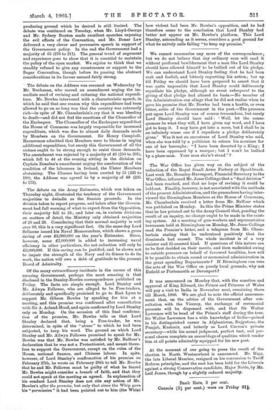The debate on the Address was resumed on Wednesday by
Mr. Buchanan, who moved an amendment urging the im- mediate need of revising and reducing the national expendi- ture. Mr. Bowles intervened with a characteristic speech, in which he said that one reason why this expenditure had been allowed to go on so long was that the country was extremely rich—in spite of Mr. Chamberlain's cry that it was bleeding to death—and did not feel the exactions of the Chancellor of the Exchequer. The Chancellor of the Exchequer argued that the House of Commons was largely responsible for increased expenditure, which was due to almost daily demands made by Members on the Government. Sir Henry Campbell. Bannermanadmitted that Members were to blame in urging additional expenditure, but surely this Government of all the virtues ought to be strong enough to resist these demands. The amendment was rejected by a majority of 49 (250 to 201), which fell to 44 at the evening sitting in the division on Captain Donelan's amendment urging the amelioration of the condition of the labourers in Ireland, the Ulster Members abstaining. The Closure having been carried by 55 (235 to 180), the Address was agreed to by a majority of 60 (235 Lo 175).
•










































 Previous page
Previous page